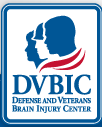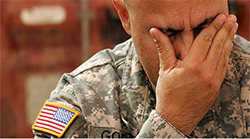TBI
TBI Basics
- A traumatic brain injury (TBI) can be classified as mild, moderate, severe or penetrating. The severity is determined at the time of injury.
- A TBI is a blow or jolt to the head that disrupts the normal function of the brain. It may knock you out briefly or for an extended period of time, or make you feel confused or “see stars” (alteration of consciousness).
- Not all blows or jolts to the head result in a TBI.
- The most common form of TBI in the military is mild. Concussion is another word for a mild TBI.
Sleep: More Important Than You Think
As a caregiver for a husband with traumatic brain injury (TBI), Rosemary Rawlins shares insights garnered from her own experiences along with insights from other caregivers and family members in her blog, “Learning by Accident,” on BrainLine. In this blog post, she talks about sleep — how poor sleep can affect you physically and mentally, and how simple changes to your daily routine can make for a good night’s rest.
VA to Expand Benefits for Traumatic Brain Injury
Adds Five Illnesses Related to Service-Connected TBI
WASHINGTON – Some Veterans with traumatic brain injury (TBI) who are diagnosed with any of five other ailments will have an easier path to receive additional disability pay under new regulations developed by the Department of Veterans Affairs. The new regulation, which takes effect 30 days from 16 Dec 2013, impacts some Veterans living with TBI who also have Parkinson’s disease, certain types of dementia, depression, unprovoked seizures or certain diseases of the hypothalamus and pituitary glands. Read more about this expansion of benefits for TBI.
Defense and Veterans Brain Injury Center (DVBIC) Website
 This website has information about various programs of the Defense and Veterans Brain Injury Center (DVBIC).
This website has information about various programs of the Defense and Veterans Brain Injury Center (DVBIC).
DVBIC Brainwaves Newsletter
Stay up-to-date on the latest military TBI information with the latest edition of the Defense and Veterans Brain Injury Center newsletter.
Facts About Traumatic Brain Injury
Facts about Traumatic Brain Injury (PDF document) from the Centers for Disease Control and Prevention
Loss & Grief and Associated Mood Disorders
 PTSD-Depression Mood Disorders include disorders that have a disturbance in mood as the predominant feature. It should be noted that “mood disorders” are a natural consequence of most traumatic brain injuries (TBI). Associated Mood Disorders–Depression, Survivors Guilt, Loss & Grief and Generalized Anxiety is a 24 page 1477KB Adobe PDF document and may take some time to download on a slow Internet connection.
PTSD-Depression Mood Disorders include disorders that have a disturbance in mood as the predominant feature. It should be noted that “mood disorders” are a natural consequence of most traumatic brain injuries (TBI). Associated Mood Disorders–Depression, Survivors Guilt, Loss & Grief and Generalized Anxiety is a 24 page 1477KB Adobe PDF document and may take some time to download on a slow Internet connection.
TBI Patient Education Tools
The Army Proponency Office for Rehabilitation and Reintegration (PR&R) has worked with subject matter experts in traumatic brain injury to produce helpful patient education tools. These tools are only to be used under the guidance of a health care provider.
Living With TBI
Living with Traumatic Brain Injury (TBI) is an information center and a source of inspiration for those with an injured brain, and for their caregivers, families and friends.
Trouble Adjusting To Home Life?
 AfterDeployment.org offers web-based tools targeting behavioral health issues and delivers wide-ranging content from diverse sources, all within a common user experience. A learning management system integrated into the site supports the delivery of eLearning assessments and workshops that facilitate self-paced learning and behavior-change strategies.
AfterDeployment.org offers web-based tools targeting behavioral health issues and delivers wide-ranging content from diverse sources, all within a common user experience. A learning management system integrated into the site supports the delivery of eLearning assessments and workshops that facilitate self-paced learning and behavior-change strategies.
DCoE Web Site Offers Specialized Content for Visitors
The Defense Center of Excellence For Psychological Health and Traumatic Brain Injury Web site contains audience-specific sections for warriors, families, news media and health professionals. The specialized content will make it easier for these audiences to quickly find the resources and information they need to answer their psychological health (PH) and traumatic brain injury (TBI) questions.
The National Intrepid Center of Excellence (NICoE)
 The National Intrepid Center of Excellence (NICoE) is a Department of Defense organization working to advance the clinical care, diagnosis, research and education of military service members with traumatic brain injuries (TBI) and psychological health (PH) conditions. NICoE provides diagnostic evaluations and treatment of complex TBI and PH conditions to promote physical, psychological and spiritual healing. This center would respond to the growing needs of those with traumatic brain injury (TBI) and psychological health (PH) concerns, and serve as a leader in TBI patient focused care and research throughout the MHS.
The National Intrepid Center of Excellence (NICoE) is a Department of Defense organization working to advance the clinical care, diagnosis, research and education of military service members with traumatic brain injuries (TBI) and psychological health (PH) conditions. NICoE provides diagnostic evaluations and treatment of complex TBI and PH conditions to promote physical, psychological and spiritual healing. This center would respond to the growing needs of those with traumatic brain injury (TBI) and psychological health (PH) concerns, and serve as a leader in TBI patient focused care and research throughout the MHS.
The primary patient population of the NiCoE is active duty service members with TBI and PH conditions who are not responding to conventional therapy. After being referred by their military health care provider and accepted into the treatment program, the service member goes to the NICoE for two to three weeks, where they will stay in a NICoE-dedicated Fisher House on the Bethesda campus. A spouse or other family member may stay with the service member during the time of treatment. Service members return to their duty station or referring military treatment facility upon the completion of their time at the NICoE with a personalized treatment plan aimed at helping them return to active duty.
Exploration of Traumatic Brain Injury
The Journey Home is the Center of Excellence for Medical Multimedia (CEMM) Traumatic Brain Injury Web Site. This site explores Traumatic Brain Injury (TBI), and provides information for patients, family members, and caregivers.
TBI Case Management
This website has information about Military TBI Case Management Resources.
Mild TBI Case Management Guidance
Defense Centers of Excellence for Psychological Health and Traumatic Brain Injury (DCoE) has released two documents—the “Case Management for Concussion/Mild Traumatic Brain Injury Guidance Document” and the “Case Management for Concussion/Mild Traumatic Brain Injury Guidance Fact Sheet.” These documents were created for military case managers who support service members and their support systems living with concussion, also known as mild traumatic brain injury (TBI).
Role of Caregivers
Caregivers of family members or friends who have a TBI are encouraged to visit Caregiver’s Journey for information on the important role caregivers play in TBI recovery, resources for caregiver support, and self-care strategies.
TBI Today Newsletter
The latest issue of TBI Today, the newsletter from the Virginia Commonwealth Traumatic Brain Injury Model System. (PDF Document)
Things NOT to Say to Someone with a Brain Injury
This article has helpful information about talking to someone with TBI.
![]()